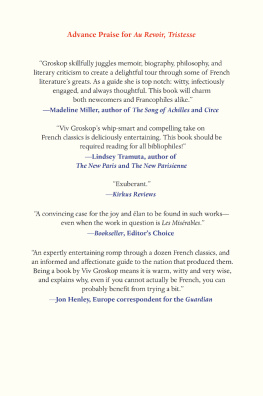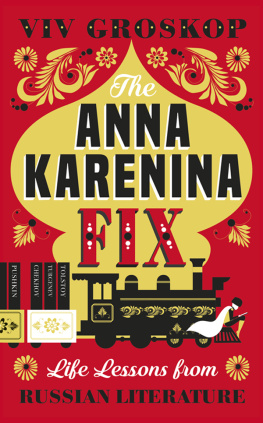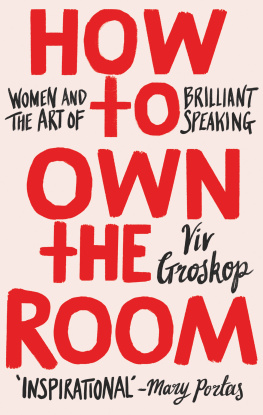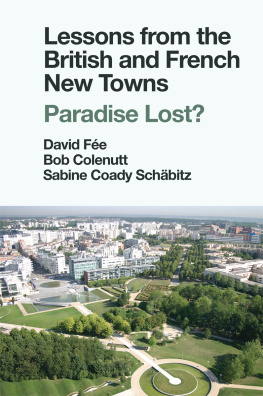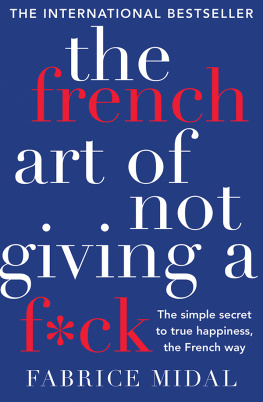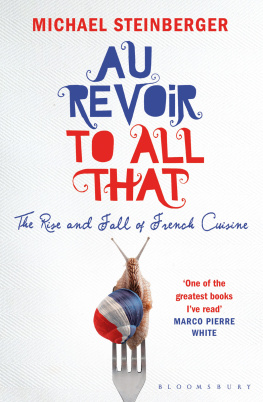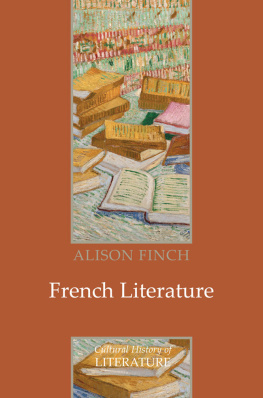Viv Groskop - Au Revoir, Tristesse: Lessons in Happiness from French Literature
Here you can read online Viv Groskop - Au Revoir, Tristesse: Lessons in Happiness from French Literature full text of the book (entire story) in english for free. Download pdf and epub, get meaning, cover and reviews about this ebook. year: 2020, publisher: Abrams, genre: Art. Description of the work, (preface) as well as reviews are available. Best literature library LitArk.com created for fans of good reading and offers a wide selection of genres:
Romance novel
Science fiction
Adventure
Detective
Science
History
Home and family
Prose
Art
Politics
Computer
Non-fiction
Religion
Business
Children
Humor
Choose a favorite category and find really read worthwhile books. Enjoy immersion in the world of imagination, feel the emotions of the characters or learn something new for yourself, make an fascinating discovery.
- Book:Au Revoir, Tristesse: Lessons in Happiness from French Literature
- Author:
- Publisher:Abrams
- Genre:
- Year:2020
- Rating:4 / 5
- Favourites:Add to favourites
- Your mark:
- 80
- 1
- 2
- 3
- 4
- 5
Au Revoir, Tristesse: Lessons in Happiness from French Literature: summary, description and annotation
We offer to read an annotation, description, summary or preface (depends on what the author of the book "Au Revoir, Tristesse: Lessons in Happiness from French Literature" wrote himself). If you haven't found the necessary information about the book — write in the comments, we will try to find it.
Viv Groskop: author's other books
Who wrote Au Revoir, Tristesse: Lessons in Happiness from French Literature? Find out the surname, the name of the author of the book and a list of all author's works by series.
Au Revoir, Tristesse: Lessons in Happiness from French Literature — read online for free the complete book (whole text) full work
Below is the text of the book, divided by pages. System saving the place of the last page read, allows you to conveniently read the book "Au Revoir, Tristesse: Lessons in Happiness from French Literature" online for free, without having to search again every time where you left off. Put a bookmark, and you can go to the page where you finished reading at any time.
Font size:
Interval:
Bookmark:
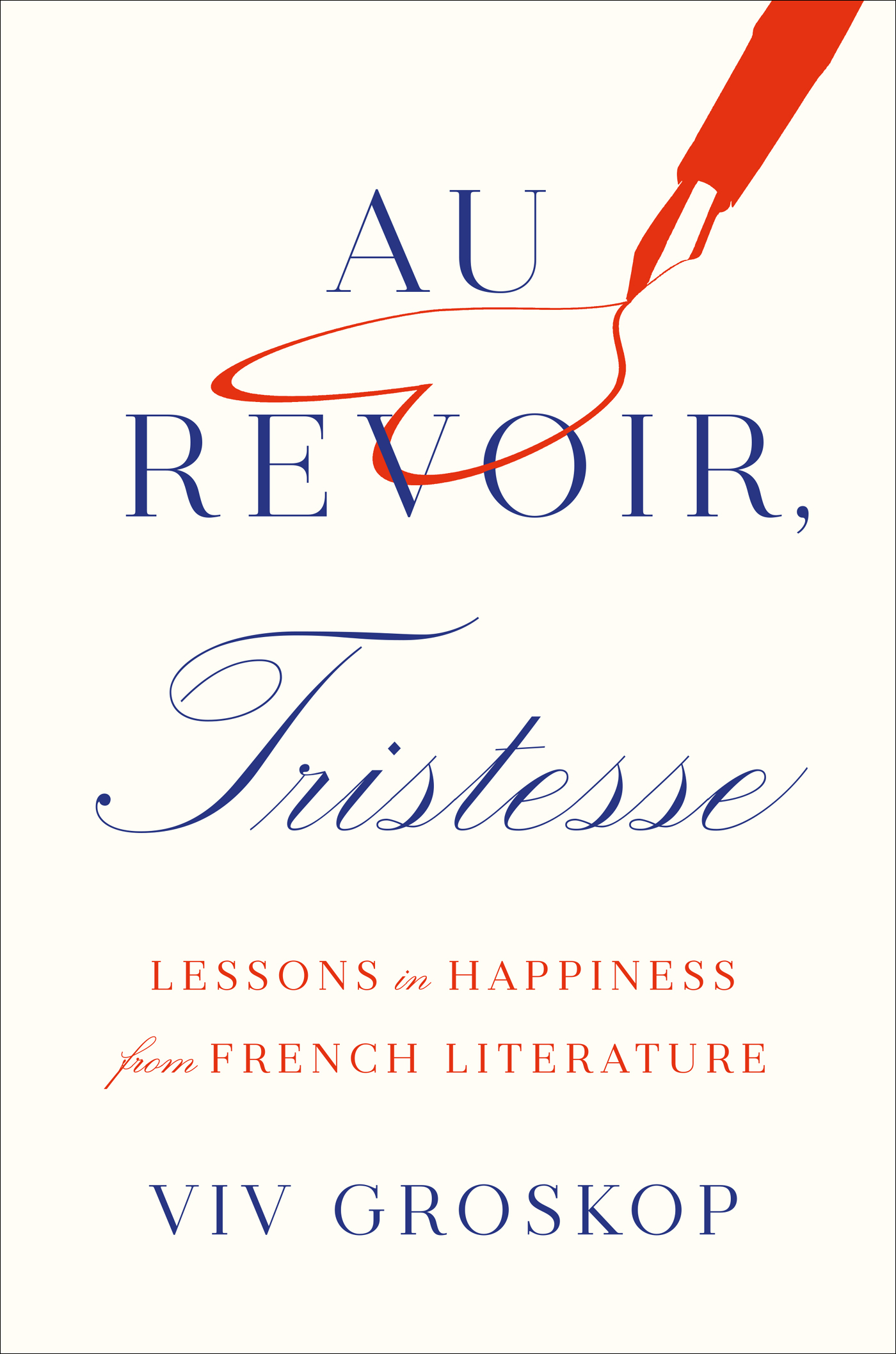
ALSO BY THE AUTHOR
The Anna Karenina Fix: Life Lessons from Russian Literature

Copyright 2020 Viv Groskop
Cover 2020 Abrams
Published in 2020 by Abrams Press, an imprint of ABRAMS. All rights reserved. No portion of this book may be reproduced, stored in a retrieval system, or transmitted in any form or by any means, mechanical, electronic, photocopying, recording, or otherwise, without written permission from the publisher.
Library of Congress Control Number: 2019939885
ISBN: 978-1-4197-4298-9
eISBN: 978-1-68335-797-1
Abrams books are available at special discounts when purchased in quantity for premiums and promotions as well as fundraising or educational use. Special editions can also be created to specification. For details, contact specialsales@abramsbooks.com or the address below.
Abrams Press is a registered trademark of Harry N. Abrams, Inc.

ABRAMS The Art of Books
195 Broadway, New York, NY 10007
abramsbooks.com
Savoir, penser, rver. Tout est l.
(To know, to think, to dream. Its all there is.)
VICTOR HUGO
There is one very obvious life lesson the French want to teach us: If you want to be happy, its best to be French. If you want to lead the ideal kind of life, then that life is to be found in France. Franoise Sagan is the embodiment of this. She is a joyously indifferent shrug in human form. She embodies joie de vivre and the freedom to do whatever the hell you want. That, surely, is what most of us define as happiness? Taking real pleasure in every moment, eating the best food, drinking the best drink, falling in love, following your passions... The French think they do all this better than the rest of us. And Franoise Sagan looks as if she does it even better than the average French person. She may have written a novel entitled Bonjour Tristesse (Hello Sadness). But she embodies the idea of Au Revoir, Tristesse (Goodbye, Sadness). And isnt sadness the one thing we all want to say goodbye to?
I first encountered Sagan on British television in the 1980s. I was watching a BBC travel documentary, Postcard from Paris, hosted by the Australian broadcaster Clive James, which was a phenomenon in Britain at the time. This television show was so popular, Clive James wrote later in the New Yorker, that even Princess Diana videotaped it if she was going out. In the show, James wandered around by the banks of the Seine looking dreamy and wistful, interviewed French celebritiesalthough no men were interviewed in this program, only attractive womenand in one episode, he was chauffeured by Franoise Sagan in her own car. Sagan pulls up in a screech of tires, apparently wearing no seat belt, and off they go at around ninety miles per hour through a built-up area. It is quite quick, this car, says James nervously in slow English so that she can understand. Later, he adds: You really like speed, dont you? She doesnt take the hint.
Life is so slow, says Sagan lazily. As she is driving him around Paris as if her white Citron were an emergency vehicle, he attempts to interview her while she attempts to break the speed limit. She shrugs nonchalantly about the serious car crash she had at the age of twenty-one, from which she emerged with almost every bone in her body broken: Eleven ribs, two wrists, and the head open. They thought I was dead. They closed my eyes. As shes telling this gruesome accident story, she hits a pedestrian and drives on, still shrugging, as James whimpers quietly. A voiceover breaks in: We only hit his briefcase. But the impact left him spinning in the street like a weathervane.
This footage played in my minds eye quite a while, and I would often remember it and chuckle to myself. Goodbye, sadness, indeed. But when I came to look for this documentary, years later, I couldnt find it. Unlike Princess Diana, I hadnt been smart enough to record it. I began to wonder if I had invented it. After all, it was my own personal fantasy of what it meant to be a certain kind of French person. You drove around Paris not minding what anyone thought of you, hitting pedestrians briefcases and not giving a damn. By this point I could speak quite a bit of the language and was hoping the effects of that were turning me French. Maybe without the homicidal bit. Sagans behavior was the dream. A slightly monomaniacal and evil dream, yes. But the dream. Or at least a watered-down version of it. Even if it felt a bit too outlandish to be true. Was it so much of a dream that it was in fact an actual dream?
Then, suddenly, a couple of years ago, when I was Googling something else, I stumbled across the video and I was transported back to that moment. Turns out it was from 1989. It was the voiceover that really hit me in a jolt of recognition; Clive Jamess slow, deliberate, cynical Australian drawl. In the introduction he is describing a phenomenon that can only be experienced by reading a writer that you love. He quotes Sagan: Something wells up in me that I greet by name: Bonjour, tristesse. He continues, as the camera pans across the Pont des Arts: Franoise Sagan was seventeen years old when she wrote that, and she was here, a writer in Paris. I was at the other end of the world, dreaming about being a writer in Paris. I dreamed of Left Bank caf tables, where I would sit writing my own sensationally precocious novel, called Au Revoir, Sydney. Here was the proof I had experienced when I first saw that film: This is a way that people feel. Other people feel this way. It is real.
The desire to escape ourselves and find a better way to live is a huge part of the reading experience. The novelist Jeanette Winterson calls reading a lifelong collision with minds not like your own. Learning a language and discovering the writers who wrote in that language is a double collision. You access the mind-set of another culture through language. And you access it deeper through reading. This was the hard-core collision I wanted, and it was the hotline to the particular kind of French happiness I craved. I had spent my teen years dreaming of the exact same thing as Clive James: Au revoir, boring England! Bonjour, Paris! It was a love affair that started with school French lessons at the age of eleven and was reinforced by summers spent in France during my adolescence. By the time I was old enough to discover the great French writers not just on TV but properly, I was completely hooked.
That television footage was the start of an obsession with these authors, beginning with Sagan, who was one of the easiest and most attractive places to start, especially for a teenager. I wanted to read their stories in order to understand their world, to understand them, to think like them. To be less myself and more, well, French. Sagans attitude in that interview represented something extraordinary for me. Here was a woman who lived life in a reckless, impetuous, and selfish way. She was unlike anyone I had ever seen before. She was free. Almost too free. Free enough to knock people over in the street and not care about it. I wasnt sure exactly what this was supposed to teach me about how to live a better life. But I felt that if I tried hard enough, it would seep into me. Although I had a few reservations. Surely if you want to live a good life, you should try not to run people over? I decided not to think too much about this. I could sense there was something elusive, intriguing, and important about the French way of thinking about life and about happiness. They followed slightly different rules than the rest of us. And maybe if I could learn those rules, I could live like them.
Font size:
Interval:
Bookmark:
Similar books «Au Revoir, Tristesse: Lessons in Happiness from French Literature»
Look at similar books to Au Revoir, Tristesse: Lessons in Happiness from French Literature. We have selected literature similar in name and meaning in the hope of providing readers with more options to find new, interesting, not yet read works.
Discussion, reviews of the book Au Revoir, Tristesse: Lessons in Happiness from French Literature and just readers' own opinions. Leave your comments, write what you think about the work, its meaning or the main characters. Specify what exactly you liked and what you didn't like, and why you think so.

